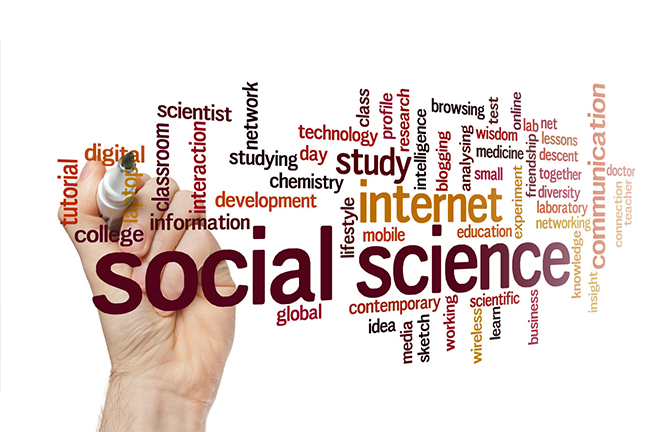Humanities, social sciences amid ‘intelligence revolution’

Social science in the new era Photo: TUCHONG
As digital technology continues to advance and make significant strides, the digital transformation of individuals and society presents numerous ethical and governance challenges, while also impacting the traditional model of knowledge creation. It is imperative for the humanities and social sciences in the new era to understand and respond to this transformation through deeper interdisciplinary integration in two dimensions. One concerns integration within the humanities and social sciences, the other concerns integration between the humanities and social sciences and natural sciences, particularly modern information technology.
Intelligence revolution
Traditionally, the humanities and social sciences differ greatly from natural sciences in terms of research objects and methodologies. Over time, the various disciplines within the humanities and social sciences have not only matured but also gradually diverged, marked by increasingly distinct research paradigms and basic characteristics. In the present day, the humanities and social sciences are undergoing an intelligence revolution, wherein “everything can be digitized.”
This process begins with the digitization of analogue materials, enabling machines to identify, learn, and infer the significance of human knowledge on a large scale. Subsequently, it involves discovering and establishing connections between knowledge from various disciplines to formulate comprehensive theories through interdisciplinary integration. These theories are aimed at assisting human understanding, judgment, and decision-making, thereby facilitating intelligent human-machine symbiosis as well as knowledge creation, accumulation, and dissemination under the new paradigm of the humanities and social sciences.
Breaking down silos
On the one hand, the differentiation between the humanities and social sciences and natural sciences serves as a clear framework for the production, accumulation, and dissemination of human knowledge, allowing researchers to conduct in-depth, rigorous studies in their own fields. On the other hand, overly rigid distinction hinders necessary interdisciplinary research, dialogue, and cooperation between different fields.
AI technology is reshaping traditional concepts of labor, the social division of labor, and human understanding of the humanities and social sciences. This transformation contributes to broadening the scope of humanities and social science research, fostering a deeper understanding of human thought and behavior within the social context, as well as the future trajectory of human civilization amid the trend of deep technicalization.
The widespread application of AI technology in the humanities and social sciences has also brought about significant changes in personal and professional life, as well as in the concept of identity. AI is gradually supplanting humans in standardized and programmatic intellectual work. How can humanity achieve holistic development with dignity and freedom in the digital age? This is a critical issue that the new humanities and social sciences must confront.
The contemporary academic community has realized the importance of knowledge integration within the humanities and social sciences, and between the humanities and social sciences and natural sciences. AI is not merely a digital tool. It offers profound insights into human nature, intelligence, self, and society. This emerging technology helps meet the urgent need for interdisciplinary integration so that academic research can regain a comprehensive understanding of the world.
Integration of values, knowledge, and skills
The boundaries between scientific disciplines are becoming increasingly blurred. For instance, AI relies on mathematical and statistical models and necessitates the comprehension and manipulation of quantified data, aligning it the domain of natural sciences. However, the development and application of AI also gives rise to ethical and social issues that fall within the scope of the humanities and social sciences. Therefore, contemporary science should be considered in its entirety rather than being divided into two entirely independent branches.. “The humanities and social sciences” and “natural sciences” are intertwined and complement each other.
Given AI’s potential to radically change traditional humanities and social science education, China should actively promote technological empowerment and interdisciplinary integration on the one hand, while steering education towards the integration of values, knowledge, and skills on the other. A new education ecosystem characterized by resource sharing and value co-creation should be built around universities, companies, trade associations, and public service organizations.
It is advisable to widely apply the multi-scale, multimodal, automated, and digital methods associated with AI technology in the new humanities and social sciences in order to understand the vast amount of information present in those fields. Digital intelligent technology can be used as a new medium to promote the informatization and modernization of new humanities and social science education.
AI technology has implications for economic growth, the balance between diverse values such as security and fairness, and social consensus. AI products may contain hidden biases of the developers, and true innovation and value could be overshadowed by banal common sense constructed and selected by algorithms. It is thus important to reshape public values and foster innovation awareness. Education of values, knowledge, and skills will be integrated into the processes of personalized learning and lifelong learning.
In the digital age, both the new humanities and social sciences and natural sciences should aim to improve human understanding of the natural world and social life, minimize the risks of intelligent technologies, and enhance the overall well-being of society.
Zhao Han is from the Law School of Tsinghua University. Lu Junqun is the Secretary General of the Institute for AI International Governance of Tsinghua University.
Edited by WANG YOURAN
